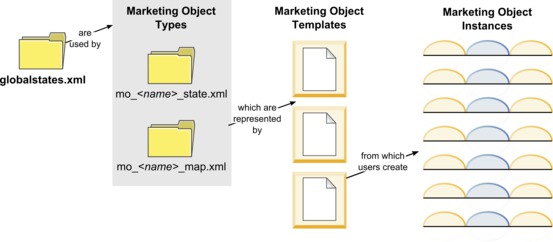Marketing object types
Marketing objects are the work products that a team develops and reuses in the course of marketing activities. In addition to a set of standard marketing object types that is supplied with HCL® Marketing Operations, you can create custom marketing object types.
Standard marketing object types
HCL Marketing Operations provides a standard set of marketing object types that represent work products that most organizations use to plan and manage marketing goals:
- Plans
- Programs
- Projects
- Assets
These standard marketing object types are added when optional features are enabled for Marketing Operations:
- Invoices (Financial Management module)
- Offers (systems with Marketing Operations and Campaign are integrated and offer integration enabled)
Custom marketing object types
At your organization, users may need to track other types of marketing objects. Marketing objects can include physical items, such as a letter, credit card, or banner ad. Marketing objects can also represent business components, such as a credit card offer, target segment definition, or rewards program definition. You can define a custom marketing object type for each physical item or business component you want to manage and track in Marketing Operations. Given the examples that are listed above, you create these custom marketing object types.
- Letter
- Credit card
- Banner ad
- Credit card offer
- Target segment definition
- Rewards program definition
After you add a custom marketing object type, you create one or more templates for it. For example, you can create separate letter templates for different kinds of form letters. Each template can then be used multiple times to create different instances of that type of letter.
Components of marketing object types
The following diagram shows the internal representation of marketing object types in HCL Marketing Operations, and how the components relate to one another.

Typically, object instances move through a series of states or workflow statuses, such as Not Started, In Progress, and Completed. A single XML file defines the possible states for all marketing object types, both standard and custom. To specify the states that users can select for a marketing object type, and the transitions that are allowed between states, you update that marketing object type.
